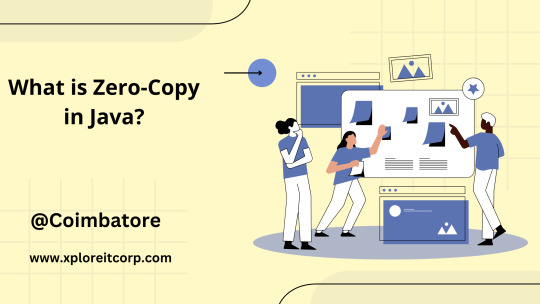#Java backend programming
Explore tagged Tumblr posts
Text
What are Java Variables and Why Are They Important in Programming?
When you first dive into Java, one of the main things you'll come across is variables. So, what are Java variables and why do they matter in programming? Simply put, they’re like containers that hold data for your program. They give you the flexibility you need to create cool applications. Grasping this idea is key to starting any Java course in Coimbatore.
The Basics of Java Variables
At the heart of it, Java variables are placeholders for data. Each variable has a specific type such as int, float, or String, which tells you what kind of data it can hold. Without them, managing data in your application would be tough. Knowing how to declare and use them is a must if you're looking at a Full Stack Developer Course in Coimbatore.
Types of Java Variables
Java has a few types of variables: local, instance, and static. Local variables exist only in methods, instance variables are tied to objects, and static variables belong to the class itself. Understanding these differences will help clarify what variables are and why they’re important in programming. You’ll go over this in detail during any professional Java training in Coimbatore.
Why Java Variables Matter
Java variables are important because they help developers write clean and logical code. They make it easier to reuse code and manage user input data effectively. This is why they are a key topic in any Java course in Coimbatore.
Declaring and Initializing Variables
To declare a variable in Java, you write the data type followed by the variable name, like so: `int age = 25;`. You can also set a value at a later point. This simple way of managing data shows why variables are important—they help you keep things organized, which is a vital skill you’ll learn in a Full Stack Developer Course in Coimbatore.
Scope and Lifetime of Variables
The scope of a Java variable refers to where it can be used in your code. For instance, a local variable is only available in the method where it's created. Getting a handle on variable scope will help you understand their importance in programming. You'll find this topic covered in detail during Java training sessions in Coimbatore.
Best Practices in Using Variables
Using clear variable names, keeping their scope small, and initializing them before use are some good habits that make programming easier. These practices show you what variables are and why they're important, and they’re stressed in every advanced Java course in Coimbatore.
Variables in Full Stack Development
In full stack Java development, variables are used in both the front-end and back-end parts of apps. They play a role in everything from handling UI inputs to managing databases. That’s why understanding what variables are and why they matter becomes even more relevant in a Full Stack Developer Course in Coimbatore where real-world projects are tackled.
Common Errors and Debugging Tips
Beginners often run into issues like forgetting to initialize variables or using the wrong data type. Spotting these mistakes is a big part of learning about variables. Regular debugging sessions and hands-on practice in Java training in Coimbatore can help you work through these challenges.
Conclusion: Build Your Java Skills with Xplore IT Corp
To really get a grip on what Java variables are and why they matter, practical experience is essential. Whether you’re starting out or aiming for a full stack role, a solid understanding of variables and similar concepts is crucial. Sign up for a Java Course, Java Training, or Java Full Stack Developer Course in Coimbatore with Xplore IT Corp to kickstart your Java programming journey.
FAQs
1. What are Java variables?
Java variables are storage spots for data that can change while the program runs.
2. Why are variables important in Java programming?
They help in handling data, keeping your code clean, and supporting dynamic data operations.
3. Are Java variables covered in a full stack course?
Yes, they're a key part of programming logic and are thoroughly covered in a Full Stack Developer Course.
4. Can I learn about Java variables online in Coimbatore?
Definitely! Most online Java training programs cover variables and data types.
5. Is mastering variables necessary before learning advanced Java?
Yes, they are a fundamental concept, and getting a handle on them is important before moving on to more advanced topics.
#Java data types#variable declaration in Java#Java variable scope#types of variables in Java#Java programming basics#object-oriented programming in Java#local variables in Java#instance variables in Java#static variables in Java#Java syntax#Java full stack developer skills#Java coding for beginners#Java development training#Java backend programming#Java learning institute in Coimbatore
0 notes
Text
introduction. hi :)
hello!!
i wanted to document my process of learning to code :) it's something i've always been interested in, but never got to, because i felt like it would take too much time to become good. well, the time will pass anyways, i need a project to stay sane. i have adhd, so it's somewhat of a developing hyperfixation / special interest for me.
i was using sololearn to learn, before i got paywalled :/ -- now i'm using freecodecamp and will probably also use codeacademy. on freecodecamp, i'm doing the certified full stack developer program which will (from my understanding) teach me to code front-end / client side as well back-end. i knew some HTML to begin with, but so far i've finished the basics of HTML mini-course and am on to structural HTML. After the full HTML topic, the course teaches me CSS, Java, Back-End Javascript and Python.
LONG STORY SHORT!! let's be friends, because i love doing this. also i need help. and advice. so much of it. m




#codeblr#studyblr#programming#coding#web development#web developing#progblr#backend development#frontend#frontenddevelopment#html#html css#java#javascript#python#fullstackdevelopment#computer science#stem#stemblr#introduction#looking for moots#mutuals#looking for mutuals
10 notes
·
View notes
Text

Fellow nerds of tumblr, I hate to admit that I... For the first time... Am learning Java...
I know I have sworn my faith to the procedural church, and worn my C preacher robes with pride.
But sadly the world around us is still in the dark, and the higher ups demand a sinful way of life. Especially the ones looking to hire.
Please find solace in the fact that I am deeply unhappy with this fact, but a girl's gotta get a job. I promise my faith will not waver in these dark times.
#fitting for october 1st#picked the scariest language#there are also definitely other languages used in backends#but i heard a statistic saying something like 50% of backends are still in java#so#it makes sense#codeblr#programming
79 notes
·
View notes
Text
FullStackJava: Mastering Both Ends of the Stack
Java isn't just for backend anymore! As a full stack Java developer, you'll wield powerful tools on both sides:
Frontend:
JavaServer Faces (JSF)
Thymeleaf
Vaadin
Backend:
Spring Boot
Hibernate ORM
RESTful APIs
Database:
JDBC
JPA
Build & Deploy:
Maven/Gradle
Docker
Jenkins
Embrace the versatility. Java full stack = limitless possibilities.
3 notes
·
View notes
Text

Summer Internship Program 2024
For More Details Visit Our Website - internship.learnandbuild.in
#machine learning#programming#python#linux#data science#data scientist#frontend web development#backend web development#salesforce admin#salesforce development#cloud AI with AWS#Internet of things & AI#Cyber security#Mobile App Development using flutter#data structures & algorithms#java core#python programming#summer internship program#summer internship program 2024
2 notes
·
View notes
Text
🔰 Starting out in Java? You’ve probably seen this line over and over: public static void main(String[] args) { // your code here } But did you know Java allows several valid variations of the main method? Let’s break it down for clarity! 👇 ✅ 𝑽𝒂𝒍𝒊𝒅 𝒎𝒂𝒊𝒏 𝑴𝒆𝒕𝒉𝒐𝒅 𝑺𝒚𝒏𝒕𝒂𝒙𝒆𝒔: 1️⃣ public static void main(String[] args) → Standard & most widely used 2️⃣ public static void main(String args[]) → Old-school array syntax (still valid) 3️⃣ public static void main(String... args) → Uses varargs — flexible and works the same 4️⃣ public static void main(String[] myCustomName) → Parameter name can be anything! ❌ 𝙄𝙣𝙫𝙖𝙡𝙞𝙙 𝙎𝙮𝙣𝙩𝙖𝙭𝙚𝙨: 🚫 public void main(String[] args) → Missing static 🚫 static void main(String[] args) → Missing public 🚫 public static void main(int[] args) → Wrong parameter type 🔎 The JVM specifically looks for: public static void main(String[] args) 🧠 𝙁𝙪𝙣 𝙁𝙖𝙘𝙩: You can overload the main method, but only the correct one (String[] args) will run by default! 📚 𝗡𝗲𝘄 𝘁𝗼 𝗝𝗮𝘃𝗮? Check out my full beginner-friendly blog post on this topic: 👉 https://wp.me/paNbWh-2l 💬 Got any Java tricks you wish you knew earlier? Drop them below 👇 Let’s grow together. #Java #100DaysOfCode #FullStackDevelopment #CodingJourney #LinkedInLearning #Beginners
#app development#backend#beginner#code like a pro#core java#datastructures#day1 of java#day2 of java#different type of main method#different type of main method in Java#frontend#fullst#fullstack#fullstackdeveloper#Java#main methods#output#print#programming
0 notes
Text
0 notes
Text
youtube
In this video, we dive deep into the battle of backend technologies: Node.js vs. Java. Watch as we explore the differences in architecture, performance, scalability, and use cases for both technologies. From real-time features and microservices with Node.js to enterprise-level reliability with Java, our Jelvix experts share insights on which technology is best suited for your next project. Plus, we’ll discuss how a hybrid approach combining both Node.js and Java could offer the perfect balance of performance and scalability. Watch now and make an informed decision for your development needs! #Java #coding #programming
#web development#java#node js#backend#backend development#programming#coding#programming languages#Youtube
1 note
·
View note
Text

🛑 Placement Assistance Program 🛑 👉 Join our JAVA & .NET Training! 📅 New Batch: 20th Feb 2025 ⏰ Time: 11:00 AM - 01:00 PM 📍 Mode: Classroom / Online ✅ What You'll Learn:
Core Java, Advanced Java, Oracle
C# .NET, ASP.NET, MVC Core
HTML | CSS | JS, Angular 15
Data Structures, Algorithms, Soft Skills, CRT
🎯 Why Join? ✔️ Expert Instructors ✔️ Hands-on Learning ✔️ Placement Assistance
👉 Register Now: https://t.ly/bN-TR 📞 Contact: +91-9000225725 | [email protected]
Follow us for more updates: 📸 Instagram: @nareshitech
#java#java.net#software#coding#programming#javaprogramming#developer#backend#java training#placement
0 notes
Text
What is Zero-Copy in Java?

Zero-Copy is a technique that allows data to move between storage and network devices without needing to copy it into the application layer. In traditional I/O methods, you deal with several context switches and memory copies, but Zero-Copy cuts down on that, making things faster. This approach is super helpful for high-performance applications like file servers or video streaming services.
How Zero-Copy Works Internally
To get a grip on Zero-Copy in Java, you need to understand how the Java NIO (New Input/Output) package operates. It lets data flow straight from a file channel to a socket channel through methods like transferTo() and transferFrom(). This avoids using the Java heap and saves CPU cycles, which is really useful for anyone taking a Java Full Stack Developer training Course in Coimbatore .
Benefits of Using Zero-Copy
Some of the main benefits are less CPU usage, reduced latency, and better throughput. When applications need to transfer large files, they can do it more smoothly. This is especially relevant in enterprise-level development, which is a big part of the Java Full Stack Developer Course in Coimbatore. Developers learn how to improve server-client communication using features like Zero-Copy.
Use Cases in the Real World
Zero-Copy is popular in web servers, file servers, and video streaming platforms. Companies that need fast data handling tend to use this method. Students in Java Training in Coimbatore can try out Zero-Copy in lab sessions or projects related to file transfers and socket programming.
Zero-Copy vs Traditional I/O
With traditional I/O, data gets copied several times—from disk to kernel buffer, then to user space, and finally to the socket buffer. Zero-Copy skips these extra steps. Understanding this difference is key for anyone learning about performance optimization in server-side apps.
Java NIO and Its Importance
Java NIO was introduced to support scalable and non-blocking I/O tasks. It gives you the tools to implement Zero-Copy. In a Java Course in Coimbatore, you'll learn how NIO helps create fast and efficient applications, an important skill in the Java world.
Challenges and Limitations
Even though Zero-Copy enhances performance, it’s not the best choice for every situation. It's mainly useful for large file transfers rather than small bits of data. Also, debugging can get tricky because there’s less access at the application level. Students in the Java Full Stack Developer Course learn how to wisely decide when to use Zero-Copy.
Industry Demand and Career Impact
Knowing about Zero-Copy in Java can help a developer stand out, especially in roles that require high-performance application development. Many tech companies are on the lookout for skills in this area. For those in Java Training in Coimbatore, mastering these topics can lead to great job opportunities in backend and systems development.
Tools and Libraries Supporting Zero-Copy
Besides Java NIO, other frameworks like Netty also support Zero-Copy. These tools are often covered in advanced modules of a Java Course in Coimbatore. Learners can use these libraries to build scalable, high-performance applications, especially for real-time data tasks.
Conclusion: Master Zero-Copy with the Right Training
So, Zero-Copy in Java is a handy I/O method that's key for modern Java applications. To really get the hang of it, professional training is a must. Enroll in a Java Full Stack Developer Course in Coimbatore or participate in hands-on training at Xplore IT Corp, where they teach practical skills like Zero-Copy and Java NIO.
FAQs: What is Zero-Copy in Java?
1. What is Zero-Copy in Java and why is it useful?
Zero-Copy in Java allows for direct data transfer between disk and network without moving it into application memory, which boosts performance.
2. Which Java package supports Zero-Copy operations?
Java NIO supports Zero-Copy through methods like FileChannel.transferTo() and transferFrom().
3. Can I learn Zero-Copy in a Java Course in Coimbatore?
Yes, good training centers offer detailed modules on Zero-Copy, especially in full stack and advanced Java courses.
4. Is Zero-Copy suitable for all Java applications?
No, it works best for large file transfers or fast data systems where speed is important.
5. Where can I get hands-on training in Zero-Copy and Java NIO?
You can join Xplore IT Corp, recognized for its solid Java Training in Coimbatore and Java Full Stack Developer Course.
#Spring Framework in Java#Java Dependency Injection#Java Spring Boot#Spring Bean Configuration#Java Object Lifecycle#Spring ApplicationContext#Java Backend Development#Java Programming Basics#Spring Initializer#Java Class Loader
0 notes
Text
progress 2 - thur 3 april 2025
um okay so ignore that little skipping a part of my curriculum mishap. right now im working on a project in the "lab" portion of the course (where you work on your own little projects so they can test what theyve taught you). for this one, youre supposed to make a small, simple page for recipes. everything about my code registers as right except for the <meta charset=UTF-8> part. its not registering it :/ in case anyone has any advice.


help i dont know what ive done wrong.
#backend development#frontend#frontenddevelopment#html#html css#java#javascript#python#fullstackdevelopment#computer science#stem#stemblr#introduction#looking for moots#mutuals#looking for mutuals#codeblr#coding#progblr#programming#mitya-codes.txt
9 notes
·
View notes
Text
Unlock essential Stream API methods for Java developers in 2024. Level up your coding game.
#java#javaprogramming#programming#coding#backend development#java8#streamapi#java developers#technology#codingtips
0 notes
Text
1 note
·
View note
Text
Mastering Front-End Coding Challenges

#frontend#css#html#javascript#backend#developer#programming#coding#webdeveloper#webdevelopment#webdesign#frontenddeveloper#code#programmer#coder#webdev#web#python#java#php#codinglife#reactjs#softwaredeveloper#development#js#fullstack#software#dev#developers#ui
0 notes
Text

Learn and Build Summer Internship Program
For more details visit - Internship.learnandbuild.in
#data structures & algorithms#Java Core#Python Programming#Frontend web development#Backend web development#data science#machine learning & AI#Salesforce Admin#Salesforce Development#Cloud AI with AWS#Internet of things & AI#Cyber Security#Mobile app development using flutter
0 notes
